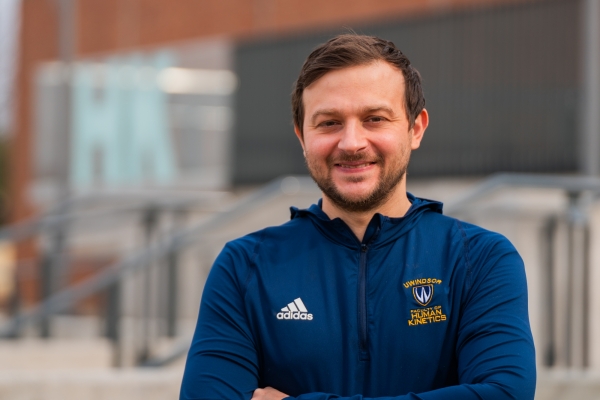 Kinesiology professor Franceso Biondi is leading a study investigating the cognitive benefits of museum visits.
Kinesiology professor Franceso Biondi is leading a study investigating the cognitive benefits of museum visits.
Research has shown that a walk in nature can significantly boost mental well-being. But can a stroll through a museum or gallery have a similar effect?
Francesco Biondi, an expert in human factors and a faculty member in the Department of Kinesiology, is leading a study to find out. In collaboration with the City of Windsor’s Chimczuk Museum, Dr. Biondi and his research team will explore how visiting museums could potentially improve cognitive functions and mental resources.
“The idea for this project stems from existing literature on cognitive restoration,” Dr. Biondi explained. “Research shows that spending time in natural environments, like urban parks or the outdoors, can reduce stress and improve well-being. Personally, I enjoy art and often visit concerts and museums. This led me to wonder if we might find a similar cognitive or restorative effect when visiting museums.”
Participants will walk in one of three possible environments for about 30 to 45 minutes. One group will take a general walk through campus, another will stroll through the Chimczuk Museum, and the third will walk through a natural environment, such as Ojibway Park or another local park.
Before heading out on their trek, participants will complete a series of tasks to assess their physiological and cognitive state, aiming to mentally fatigue them slightly before the walk.
“During the walk, participants will wear an eye tracker, which looks like a pair of glasses and allows us to monitor where they’re looking and for how long. After the walk, we’ll measure their performance on different cognitive tasks again, comparing it to their initial results. We’ll also assess brain activation metrics to see how the walk affects them in different scenarios,” Biondi said.
He anticipates researchers will see greater improvements in test performance after a visit to the Chimczuk Museum compared to a typical walk outdoors.
“Museum Windsor is very pleased to participate in this valuable research. We look forward to assisting in building scientific knowledge about the effects of museum visits on cognitive restoration,” said museum curator Madelyn Della Valle.
Biondi noted that the literature on nature suggests stress is reduced by spending time in a quiet environment among trees and the calming sounds of nature, particularly when people are away from their phones.
He believes having a quiet space free from outdoor noise, and putting down the phone will be an important aspect of the museum study as well.
“I think about when I go to museums and being exposed to the paintings and artifacts, and they have that imaginative effect of taking your mind away from your daily life and job, and just being immersed in this overall relaxing and learning environment,” Biondi said.
For more information about Dr. Biondi’s research, visit www.hslab.org.
